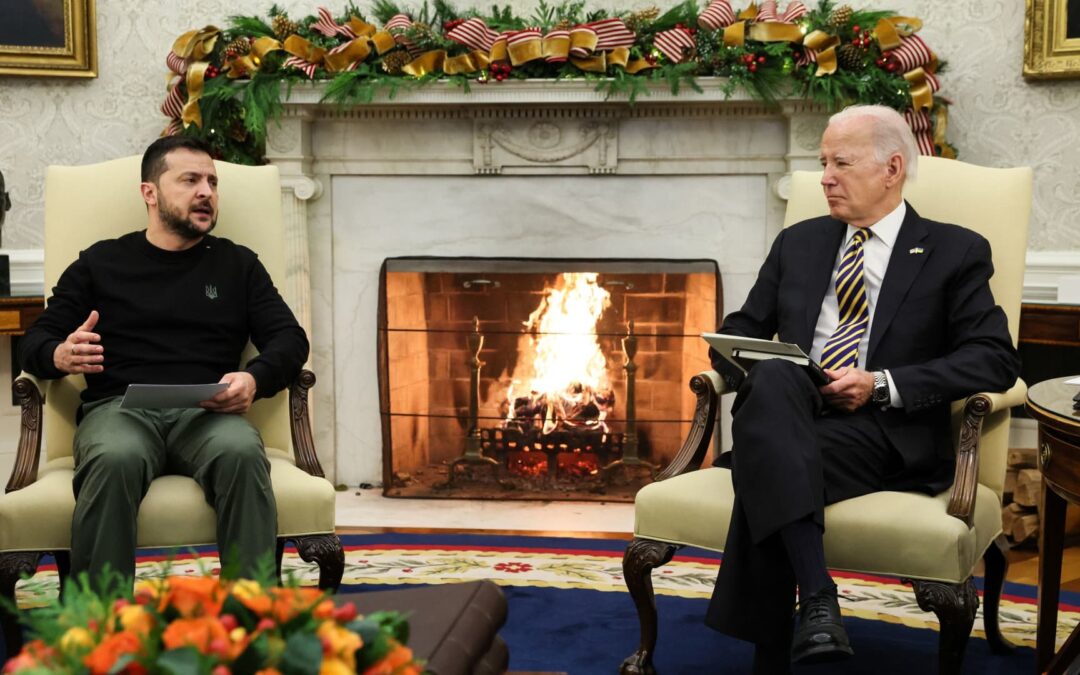U.S. President Joe Biden speaks during a meeting with Ukraine’s President Volodymyr Zelenskiy in the Oval Office at the White House in Washington, U.S., December 12, 2023.
Leah Millis | Reuters
Ukrainian President Volodymyr Zelenskyy wrapped up a series of high-profile meetings in Washington this week with no guarantees that a congressional aid package for Ukraine would be passed this year.
But if Congress pushes negotiations into 2024, it could complicate the already fraught process of passing a new federal budget, which lawmakers will have to confront in the coming months.
The temporary spending bill currently keeping government agencies open is due to expire Jan. 19 for some departments and Feb. 2 for others.
Throughout Zelenskyy’s visit, Republican hardliners in Congress expressed sympathy for Ukraine’s nearly two-year crusade against an unprovoked Russian invasion.
But they would not agree to vote for President Joe Biden’s $110 billion emergency aid bill without securing a parallel agreement to implement tougher border security measures and stricter immigration policies.
“I recognize your leadership, your country’s courage, and I want to continue to help you,” Sen. Lindsey Graham, R-SC, recalled telling Zelenskyy at the all-senators meeting on Tuesday. “But we’re not going to be able to do that until we better secure our own border because I’m worried about a 9/11.”
Senate Majority Leader Chuck Schumer, D-NY, told reporters on Tuesday that he asked Republican House Speaker Mike Johnson to keep the House in session next week to get the deal done.
Democrats are willing to cut into the holiday recess to get a package passed, according to a Democratic aide familiar with the matter.
“I would stay here indefinitely, but I don’t know that all our colleagues will be able to do that,” Speaker Johnson said at a Wall Street Journal conference on Monday.
Top Senate Republicans are increasingly skeptical that a deal can get done before the year’s end.
Senate Minority Leader Mitch McConnell, R-Ky., said Tuesday that it will be “practically impossible” to pass the supplemental aid in the next two weeks.
Punting the negotiations will not make them any easier, however. On the contrary, they will only become more difficult to finalize if they start to bleed into budget talks.
That’s what happened last September. A small but vocal group of hardline House Republicans nearly shut down the government over their opposition to $6 billion of Ukraine aid included in the federal budget.
Hours before a government shutdown deadline of Oct. 1, former House Speaker Kevin McCarthy agreed to strip out the Ukraine aid to pass a bill to keep the government open. Days later, McCarthy became the first speaker to be ousted from his position.
If Ukraine funding talks get delayed to 2024 and become a pawn in the coming budget negotiations, Speaker Johnson could be at risk of meeting the same fate McCarthy did.
Johnson already faces an uphill budget battle, without the added burden of Ukraine aid talks.
“We’ll have a lot of important quick work to do when we get back after the new year,” he said Monday.









